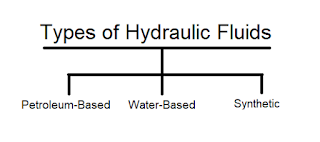Every power transmission system has some means or medium to convey power from its source to the application area. Hydraulic fluid is used to convey power from a power source such as a motor or engine to the actuator. There are different types of hydraulic fluids which we will be discussing in this post.
One point should be clear in mind that the hydraulic fluid as a working medium should not be compared with the fuel in the combustion engine, where the energy from the fuel is used to develop the power, whereas in the hydraulic system no internal energy of the fluid is used. It is used only as a medium to carry energy or power.
Table of Contents
Types of Hydraulic Fluids
- Petroleum-based hydraulic fluids
- Water-based hydraulic fluids
- Synthetic hydraulic fluids
All the above types of hydraulic fluids are discussed in this post along with their advantages, disadvantages, and applications.
Petroleum-based hydraulic fluid
Advantages of petroleum-based hydraulic fluid
- It has excellent lubricity.
- It has a higher demuslibility.
- Good oxidation resistance.
- Compatible with most sealing materials.
Disadvantages of petroleum-based hydraulic fluid
Applications of petroleum-based hydraulic fluid
Water-based hydraulic fluids
- Water oil emulsion
- Water glycols
Water oil emulsion
Water Glycols
Advantages of water-based fluids
- Due to the presence of water, they are fire-resistant.
- They are compatible with seals hoses and packing materials used for petroleum-based oils.
- They exhibit better cooling ability.
Disadvantages of water-based fluids
- The low operating temperature of not more than 50-degree Celcius to avoid evaporation and oxidation.
- A regular check is required to compensate for the loss of water due to evaporation, to maintain the correct oil-water ratio.
- Leather, asbestos, and cork impregnated materials should be avoided since they absorb water.
- In the case of water-oil emulsion, phase separation can occur.
- Viscosity decreases as the water content are reduced and hence changes in oil performance.
- Evaporation causes the loss of certain additives which in turn reduces the life of the fluid.
Synthetic fluids
- Phosphate esters
- Chlorinated hydrocarbons
Since the synthetics do not contain any water or volatile material, they operate well at high temperatures without the loss of any essential elements. They are also suitable at high pressure.
Synthetic type fluids do not operate best in low-temperature systems, the auxiliary heater may be required in a cold environment.
Advantages of Synthetic Fluid
- Synthetic fluids are non-flammable and can be used at high temperatures also.
- Synthetic fluids are also suitable for high-pressure applications.
- Synthetic fluids are available in lower ranges of viscosity. This feature makes it suitable for precision motion applications.
- Replenishing fluids can be added directly without regard for changing the viscosity or other properties, as in case of water-based fluids.
Disadvantages of Synthetic Fluid
- Synthetic fluids do not operate at low temperatures, to make these fluids work at low-temperature additional oil heaters are to be added in the tank.
- Synthetic fluids are the most expensive forms of hydraulic oil.
- Synthetic fluids have high densities, which limit the height allowed between the tank and the pump inlet without cavitation to occur.
We have discussed the types of hydraulic fluids above. Now we will see the Properties of hydraulic fluid.
Desirable properties of Hydraulic fluids
- Viscosity
- Viscosity index
- Demulsibility
- Lubricity
- Resistance to oxidation
- Resistance to foaming
- Compatibility
- Pour point
- Flashpoint
All the above properties of hydraulic fluids mentioned are discussed briefly in the Desirable properties of Hydraulic fluids.






Hey! This is my first comment here so I just wanted to give a quick shout out and tell
you I truly enjoy reading through your blog posts.
Can you suggest any other blogs/websites/forums that deal with the same topics?
Thanks!
Some of the properties of base hydraulic oils that can be improved are stability, anti-corrosion, anti-wear, viscosity-temperature stability, foaming, detergency, water separation, and friction coefficient, to name the most important ones. The viscosity of hydraulic oils is its highly important feature as it represents its resistance to fluctuations in temperatures. The viscosity index of mineral-based hydraulic oils can be improved by the addition of additives. For example, hydraulic oils with a high viscosity index improve the performance of hydraulic systems and pumps at low temperatures. At the same time, they provide protection against wear at high temperatures.